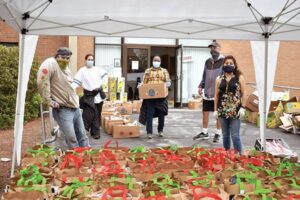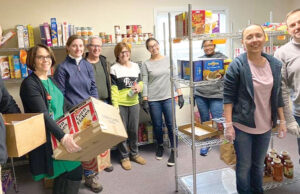By Bonnie Adams, Managing Editor

Photo/ Melanie Petrucci
Region – Food is a basic necessity for survival, yet for far too many people, being able to get food for their families is a constant worry. But in this era of the coronavirus, with rampant unemployment, schools shut down and restrictions put on other social services, it is truly becoming a public health crisis.
For State Rep. Hannah Kane (R-Shrewsbury) it has been an issue she has long been vested in – each year her annual golf tournament raises nearly $20,000 for each of the local food pantries in her district of Shrewsbury and Westborough. But Kane’s commitment to helping those in need stretches beyond her district’s borders. As such, prior to the current COVID-19 crisis, she, along with several other legislators, had formed the Food System Caucus. The pandemic has accelerated their efforts to help those in need.
As stated on its website (https://www.mafoodsystemcaucus.com), the caucus is “bicameral and bipartisan” to support and grow the local food system in the commonwealth. There are three main areas the caucus focuses on, Kane noted; food access and food insecurity, farmland, and economic development.
Impact of job losses
Since the pandemic hit, there have been 966,110 job loss claims – a staggering 25.84 percent of the workforce. Many of those jobs are in what is considered “nonessential,” such as retail stores, gyms, hair salons and other non-food related businesses. Many restaurants, who, if they chose to stay open, could only offer curbside or takeout, laid off or furloughed their employees.
“April’s unemployment data showed the highest unemployment rate since the Great Depression and the number of jobs lost in the last 10 weeks will exceed the job loss in the entire 2008-2009 recession,” Kane said.
“38 percent of Massachusetts residents now report experiencing food insecurity,” she added.
Services to assist those in need
The federal government program Supplemental Nutrition Assistance Program (SNAP), has seen a 360 percent increase in applications for March and April. This program (formerly known as food stamps) will likely be close to 600,000 by the end of June, up approximately 150,000 more than this time last year.
Many residents are also relying on the over 900 local food banks for food. Nearly 2.6 million (45 percent more) pounds of food were distributed in March of this year, compared to March of last year, representing more than 2.1 million meals.
But, Kane noted, many local food pantries are not seeing some seniors that normally use the food pantry services.
“This is a concern – they are of course worried about leaving their homes,” she said. “We are working on ways to get food to them.”
It’s also important, Kane said, that those in need do not feel embarrassed about asking for help.
“This is nothing to feel ashamed about – you did nothing wrong,” she added. “If you need for your family, there are ways to get that food.”
Many children in need rely on meals they receive at school. With schools closed, administrators have had to find ways to get those meals to them, whether they are picked up at a central location or delivered.
“Current participation at 1,500 non-congregate school meals sites while schools are closed is 24 percent, which is lower than ‘normal’ school meal service participation of 65 percent, but higher than participation in the Summer Food Service Program which is generally 14 percent,” Kane said.
Additionally, with schools closed and no alternative source of child-care, it is hard for parents to get out of the house to access food resources.
Supply chain woes
Stores have already started to see shortages of meat and poultry due to many processing plants closed down after coronavirus breakouts. Farmers have had to destroy their crops and dairy farms have sent millions of gallons of milk down the drain because so many schools and restaurants can no longer accept their products.
“Bulk food for the restaurant industry is not packaged and labeled for retail distribution,” Kane said. “Farmers, fishers and small food retailers are experiencing supply chain disruptions. We need to be able to help them stay in business as well.”
Adding to the strain, Kane noted, is that food costs nearly 18 percent more than the national average in Massachusetts and twenty four percent more in eastern Mass.
Help – and helping – on a local level
Kane recommended that those who need food first check with their local food pantry.
“They will be able to help you immediately get food,” she said. “Folks can also contact the Food Source Hotline to help access additional food assistance.”

Photo/Karen Scopetski
She also suggested that those who are in a position to help donate to an organization in their own community. Many pantries are requesting gift cards to local grocery stores or monetary donations, as opposed to physical food donations, due to health concerns.
“By donating to a pantry in your community, you know you will be helping a local person who truly needs it,” Kane said. “Even if it’s only $5, every bit helps.”
For more information:
Mass. Food System Caucus – https://www.mafoodsystemcaucus.com/
Healthy Incentives Program – https://www.mass.gov/service-details/healthy-incentives-program-hip-for-clients
Project Bread – http://www.projectbread.org/get-help/
Food Source Hotline – http://www.projectbread.org/get-help/foodsource-hotline.html 1-800-645-8333
SNAP – http://www.gettingsnap.org/howdoiapplyforsnap.html (as well as links to school closure meal sites and summer meals for students)
Contact information for local food pantries
Grafton:
Grafton Food Pantry
https://graftonfoodpantry.org/contact
847-495-0922
St. James Church
https://stjamesgrafton.com/lords-table
508-839-7685
Offering deliveries of donated groceries to local people in need.
Hudson:
Hudson Community Food Pantry
https://hudsoncommunityfoodpantry.org
978- 562-5280
First United Methodist Church
978-601-2494
Accepting donations of food, money, supplies for no contact drive through food pantry.
Marlborough:
Marlborough Community Cupboard
888-811-3291 xt.4902
Northborough:
Northborough Food Pantry
508-393-6897
Also receives donations from the St. Rose of Lima Church.
Shrewsbury:
St. Anne’s Human Services
Emergency Food Pantry Distribution every Monday at 10:30 a.m. in the church parking lot (130 Boston Turnpike while supplies last).
http://stannesparish.org/humanservices.php.
Worcester County Food Bank
508- 842-3663
Southborough:
Southborough Food Pantry
http://www.southboroughfoodpantry.org
The food pantry is a consortium of five participating local churches (Pilgrim Church, St. Matthew Church, St. Anne Church, St. Mark’s Episcopal Church, First Community Church.) People can contact through the food pantry website or can call any of the participating churches for information.
Westborough:
Westborough Food Pantry
http://westboroughfoodpantry.org
508-366-3007












